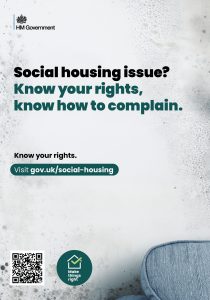Everyone deserves a safe and secure home. If you live in social housing, you can sometimes have problems with your home.
But you don’t have to put up with this. Knowing how to complain is the key to making things right.
If you or someone you know lives in social housing, and a problem with your home is giving you sleepless nights, your landlord is the first point of contact to deal with your issue. They are responsible for fixing issues including:
• damp and mould
• broken locks
• changes you need to your home if you are disabled
• anti-social behaviour, such as noisy neighbours
There are three-steps to complaining. By following them you have the best chance of getting your problem fixed.
Know the three steps to complain
Step 1. Report it to your landlord
First, report the issue to your landlord. This is who you pay your rent to – it could be your local council or a housing association. You can usually do this on their website, or by using their email or phone number.
Step 2. Complain to your landlord
If you’ve reported an issue and you feel it’s not properly sorted, complain to your landlord. Remember, you have a right to complain if you’re not happy. Your landlord will explain how to complain on their website.
When you make a complaint to your landlord about a problem that has not been fixed, they are legally required to respond to issues fairly and effectively. Landlords must take your complaint seriously and cannot punish you in any way for raising a problem or making a complaint.
Landlords have 2 stages to their complaints process.
 Stage 1: They must get back to you within 10 working days from the day you logged your complaint.
Stage 1: They must get back to you within 10 working days from the day you logged your complaint.
Step 3. Escalate to the Housing Ombudsman
If you’re still not happy with what your landlord says in their final response to a complaint, you can tell the Housing Ombudsman.
Last year, the Housing Ombudsman ordered landlords to pay over £6m to people who had problems in their homes.
You can get in contact with the Housing Ombudsman:
Everyone has the right to a safe and secure home. For more information, visit gov.uk/social-housing





